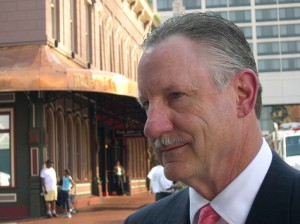
Perhaps the most controversial change being proposed to the ethics code is the get-out-of-jail-free card for public officials.
Currently the code gives the ethics review commission the duty and power to rule on the “appropriate disposition of allegations of [ethics] violations.”
The new version, however, notes that as long as a city official has reasonably relied “either directly or indirectly” on a written opinion from the city attorney’s office, then no ethics violation has occurred. Only have a verbal OK from the city attorney? You’ve got 15 days to get it in writing, and you’re still home free. If a complaint has been filed about the official’s conduct, all that is required is for the city attorney’s opinion to be produced, and “the commission shall dismiss the complaint.”
“People are not paying attention if they let something like that slip by,” said Jim Ashford, whose complaint regarding the air quality study woke the former ethics committee from its lethargy two years ago and started the whole ball rolling. “If the new version is OK’d, a city official who is acting on the opinion of a city attorney will have absolute immunity from being held accountable. And that is just wrong.”
Ashford, who has been active in urban gas drilling controversies for several years — and still has a lawsuit against Chesapeake for the noise that one of the company’s compressor stations makes — also noted that even if the attorney turns out to be wrong in his or her opinion, the city official is not held accountable for any ethical wrongdoings. “And of course, even if the city attorney provides an opinion that is criminally wrong — that’s taking it to the extreme — the city attorney cannot be held responsible either. He or she only offered an opinion, after all.”
Wechsler, the ethics researcher, said the proposed exemption is used widely — but he still disagrees with it. “Probably the number-one ethics problem in the U.S., on every level, is officials going to attorneys for ethics advice,” he said. “The attorney cannot be held responsible, and yet the official is off the hook. That makes people have less belief in the honesty and integrity of their government.”
For an official to be able to go to an in-house attorney for ethical rulings rather than to the ethics commission itself is just forum shopping, he said. “You’re just going to someone you think will give you the opinion you want.”
And officials will benefit, he said, because an attorney is going to go by the letter of the law, while the ethics committee can go beyond that, to consider how things appear. An attorney, Wechsler said, might say something is legal but will cause a scandal and who cares, while the ethics board will be looking to prevent the scandal by avoiding even the appearance of impropriety.
“Then, with the city attorney working, in effect, for the city council and at the pleasure of the city council — well, there’s a built-in conflict there,” Wechsler said. “I don’t think any city attorney worth their salt would want to be in the position of making ethics calls for the people he or she works for.
“The whole thing simply promotes corruption,” he said. “I’m not saying all city attorneys are corrupt, but it gives a city attorney way too much power.”
Not surprisingly, Fort Worth City Attorney Sarah J. Fullenwider sees it differently. “Let’s say you’re a volunteer on a board or commission, and something comes up, and you go to the city attorney and ask if you have a conflict. If the city attorney says there is no conflict, then the issue is, do you want to then subject that person to a possible ethics committee violation, or do you want to say the issue has already been settled? That’s what we’re looking at with that change.”
Picht, who has a reputation as a straight-shooter, rejects that reasoning. “The city council will manipulate the ethics code to their advantage — they’ll go to the city attorney, and he or she will go along with nearly anything to avoid a pay deduction or getting fired.”
Carter Burdette, a former long-time city councilman and currently a member of the ethics review committee, doesn’t see that conflict.
“I don’t get the feeling that allowing the city attorney to render an opinion in that circumstance is a get-out-of-trouble card,” he said. “As a former attorney I was paid all my life to render opinions to people, and I took that very seriously, and I think most attorneys do. So I don’t see any problem with that.”
********
Another potential change to the ethics code hinges on the difference between “shall” and “may” — one of those details of semantics that can turn out to make a major difference in how an ordinance actually works.
In the current code, the city council is required to reach out to local organizations for suggestions as to who should serve on the ethics review commission. The section says, “The city council shall develop a list of community, civic, and professional organizations which shall be invited to make suggestions for appointments to the committee.”
The new wording says the council may solicit such organizations to suggest appointees.
Wechsler sees the difference as much more than a quibble. “If Fort Worth is eliminating the community from the process — and changing “shall” to “may” certainly allows for that — well, then Fort Worth is going backward,” he said. In other cities, he said, the trend is the other way, in favor of having community groups recommend ethics board members, to increase the likelihood that the board will be politically independent.
Even more troubling to Wechsler and others is the proposed change that would remove most city advisory boards from the transparency requirements of the state open-meetings law.
The current city code makes no distinction between official boards and advisory boards. Under the proposed revision, however, advisory boards would not have to post meetings, allow the public to take part in meetings, or even keep minutes that would be available to the public.
In Texas that is generally legal, according to the Attorney General’s 2012 Open Meetings Handbook, which notes that “an advisory committee that does not control or supervise public business or policy is not subject to the [open meetings] Act.”
It’s not that simple, though. The handbook also notes that “if a governmental body that has established an advisory committee routinely adopts or ‘rubber stamps’ the advisory committee’s recommendations, the committee will probably be considered to be a governmental body subject to the Act.”
Wechsler said that since advisory boards are making recommendations that will affect the community, transparency is required. “The gist of it is saying that advisory board members don’t have any real authority to change things, but that’s really just playing games with the ethics issue. The legal view might say it’s technically OK because of a loophole in the meetings act, but that doesn’t make it ethical.”
In addition to the potential for secrecy involving advisory boards, Wechsler sees another downside to allowing them to operate in private. Why, he asked, would any city purposefully close out the community, “which might have expertise they could share? The only reason would be because you don’t want community participation.
“And then the flip side: What problem could having those meetings in public create? The answer is none.”
Ashford agreed. “To have advisory-only groups that don’t have to meet the standards for transparency, to have these groups meeting behind closed doors, well, to me that looks like the city is going to be denying citizens an open government,” he said.
There’s another, apparently minor, change in the proposed code revision that has Ashford riled up as well. Currently the code says the board is to include one attorney. The proposed revision would make that at least one attorney.
Ashford believes that the more lawyers there are on the ethics panel, the less representative the panel will be of the citizenry. “At one point in time, after he fired the old ethics committee members, Moncrief had three lawyers on the board,” Ashford said. “How is that representative of Fort Worth? Do we have a population made up of 60 percent lawyers?”
Wechsler said the ethics commission shouldn’t have any lawyers on it. “Attorneys are not my choice for those boards,” he said, “because they tend to be the people most likely to have ethics conflicts. They might represent [companies] that do business with the city, they might be political people — there are a host of reasons for not having them on ethics boards.”
He believes that an ethics board should hire an outside attorney to help with legal issues but that the lawyer shouldn’t have a vote. “It’s simply not appropriate for a lawyer to give counsel to a board on which he or she sits. That’s already a conflict. And that’s what the ethics board is there to avoid.”
********












Good story, Peter. You’ve just explained better than anyone has yet, the “Fort Worth Way.”
It is astonishing what the fascists who control Fort Worth have done to the taxpayers and other voters who have to live here. It’s the Fort Worth Way for sure.
Stan Rogers composed and recorded a song, “Barratt’s Privateers”, in which the exclamation in the chorus exactly expresses my hopes for their ultimate reward.
The City Attorney appears to have little or no regard for state law or the Attorney General Opinions. The matter of a City Attorney providing an opinion to a Public Official and that in turn would exempt the Public Official from any wrongdoing is contrary to Texas Attorney General Opinion GA-0068. In that opinion it states the following.
“The City of Seguin may regulate conflicts of interest involving city council
members by adopting ordinance provisions that are not inconsistent with
Local Government Code chapter 171. Thus, the city may not attempt to
exempt its officers from requirements imposed by Local Government
Code chapter 171.
Note the Attorney General Opinion specifically states “the City may not “ATTEMPT” to exempt its officers from the requirements of Local Code 171.
Local Code 171 is part of Texas Ethics requirements.
What Sarah Fullenwider proposes in the new Ethics Ordinance is exactly that, an attempt to exempt the City’s public Officials from the law.
Fort Worth citizens do not need or want City Government Officials at any level that cannot be trusted.
A large problem in having the City Attorney deem whether a city official gets a pass on an ethics violation is that he/she is looking primarily at the legal code and not an ethics code.
When Mayor Moncrief and two council members flew on a Hillwood jet to Nebraska to confer with Cabela’s officials prior to awarding a tax abatement and inclusion in a TIF, the ethics issue arose. City Attorney David Yett ruled that if the city were to reimburse Hillwood something like $850 it would be legal. You couldn’t charter a private jet for $850. But that’s not the issue – it was still unethical because we had not voted on the tax incentives and all three council members subsequently voted in favor of those incentives. Were they promised anything in return for their votes? I would hope not but that trip was out of the public view and could leave the impression that some kind of deal was made.
Ethics is not about what is legal. Ethics is about what is right versus what is wrong, what is correct versus what is incorrect, and what is moral versus what is immoral. The distinction is substantial. Not all laws are right or moral. That’s why the ethics committee was to be made up of representatives of the community. Of course that’s a long time ago when the City Council and City Attorney were ethical themselves.